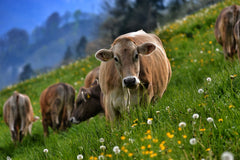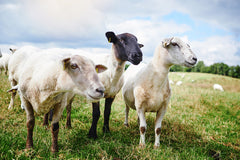
Tiny Teeth and Tender Grass: When Do Baby Goats Embark on Grazing?
If you've recently welcomed adorable baby goats to your farm or are considering raising them, you may wonder when they'll start munching on grass. As with any young animal, their diet is crucial to their growth and development. In this comprehensive guide, we will explore the fascinating journey from goats eating grass nursing to grazing, understand the factors that influence their dietary transition, and how to ensure a healthy start for these adorable creatures.
Understanding the Weaning Process In Baby Goats
Baby goats, also known as kids, are born with an instinct to nurse from their mothers. Nursing is essential for their early development, providing vital nutrients and antibodies that boost their immune system. The mother's milk is rich in proteins, fats, and vitamins, crucial for their growth and overall health during the initial weeks of life.
Optimal Age for Dietary Transition in Baby Goats
The timing of when baby goats eat grass can vary slightly depending on individual factors and the environment. On average, baby goats begin nibbling on grass when they are around two to three weeks old. Their digestive system is becoming more robust at this age, and they start exploring their surroundings. They may begin to graze on small, tender grass shoots, often mimicking their mother's eating behavior.
Signs of Readiness
It's essential to observe signs indicating baby goats are ready to transition to solid food. These signs include:
- Chewing and Gnawing: You'll notice kids showing curiosity by mimicking their mother's chewing movements, even if they are not yet ingesting. They explore various objects with their mouths, including twigs, leaves, and other forage.
- Interest in Forage: As the kids grow older, they will start showing interest in forage, leaves, and goats eating grass present in their environment. This natural curiosity prepares them for their eventual transition to a solid food diet.
- Reduced Nursing Time: While starting as kids goat eat grass and other food sources, they may gradually decrease their nursing time with the mother. However, it's essential to continue providing them with their mother's milk for several more weeks, as it remains their primary source of nutrition.
- Healthy Weight Gain: Baby goats eating grass will demonstrate steady weight gain and increased activity levels. A healthy and active kid indicates that they are prepared to transition to a more diversified diet.
Is grass good for baby goats?
Yes, grass is an excellent source of food for young goats. The best grass for goats to eat includes tender shoots and high-fiber varieties that promote rumen development. Grass and hay are significant food sources for goats, including young ones. Even though they are mostly dependent on their mother's milk for the first few weeks, baby goats are reported to begin nibbling on grass just a few days after birth, demonstrating how vital hay and grass are to newborn goats.
The Importance of a Gradual Transition for Young Goats
Although young goats may be interested in eating grass, supporting a gradual switch from milk to a solid diet is essential. Sudden dietary changes can cause stress on their delicate digestive systems, leading to digestive upsets and potential health issues. As they start nibbling on grass and other forage, their rumen, a specialized compartment in the stomach responsible for digesting fiber, begins to develop and adapt to the new diet.
Baby goats should still have access to their mother's milk during the weaning process and gradually be introduced to grazing. This allows their rumen to develop slowly and efficiently, ensuring proper digestion and nutrient absorption.
Balanced Diet for Baby Goats
A balanced diet for baby goats is vital for their growth and overall health. In addition to their mother's milk, which remains their primary source of nutrition, baby goats should have access to clean, fresh water and high-quality hay or pasture. These essential components provide the nutrients, minerals, and fiber required for proper development. Additionally, selecting the right goat feed grass blend can support optimal growth.
Providing a Safe and Stimulating Environment
It is critical to provide a safe and exciting environment for newborn goats to explore their surroundings and discover new food sources. When they start grazing, ensure the pasture or grazing area is free from toxic plants or potential hazards. Baby goats are naturally curious, and their inquisitive nature can lead them to nibble on harmful plants. Ensure that their living space is clean and well-maintained. Adding playthings and climbing frames to the environment can keep the kids entertained and avoid boredom.
Supplementing the Diet of Baby Goats
As baby goats start grazing, you can supplement their diet with specialized goat feed or grain. These feeds can offer additional nutrients to promote the developing goats' healthy development and are designed to suit their nutritional needs. However, using these supplements in moderation is essential, as an excess of grain can disrupt the balance of their delicate rumen.
To identify the proper types and dosages of supplements that fit your newborn goats' needs, speak with a veterinarian or an experienced goat farmer. Different breeds and individual goats may have varying dietary requirements, so a personalized approach is best.
Observe and Adjust
Every baby goat is unique, and their dietary transition may vary. It's crucial to observe their behavior, appetite, and overall health regularly. If you notice discomfort or digestive issues, consult a veterinarian with a goat's experience. Prompt intervention can prevent potential health problems and ensure a smooth transition to a solid diet.
What is the lifespan of a goat?
As normal lifespan of goat is 8-12 years, but they can live up to 22 years.
Conclusion
The journey of baby goats transitioning from nursing to grazing is an exciting and crucial phase in their development. Around the age of two to three weeks, they begin to show interest in grass and forage. A gradual transition, access to clean water, high-quality hay or pasture, and necessary supplements ensure they receive a balanced and nutritious diet.
Begin the journey towards livestock that's healthier and more content – tap into our collection below to explore the variety and provide your cattle with the exceptional attention they require to flourish.
HOMEOPATHIC VETERINARY MEDICINE FOR SHEEP and GOAT

DIASULE for Sheep & Goat – 500ML
DIASULE for Sheep and Goats is the best Homeopathic Veterinary Medicine for Sheep and goats that protects animals from infectious diarrhea. DIASULE for Sheep and Goats is the best combination of different homeopathic medicines which has proven effective in different types of diarrhea in large animals.

Caprasule For Sheep and Goat
Caprasule is a Homeopathic veterinary medicine for sheep and goats. It is an immunity booster that helps to boost immunity after any acute disease and deworming in Sheep and Goat.
CAPRIGO-PPR FOR SHEEP AND GOAT
CAPRIGO-PPR is Homeopathic veterinary Medicine for Sheep and Goat. It is very beneficial in controlling PPR and Its related complaints in cattle. It is very effective in this issue.

C-POXIGO FOR SHEEP AND GOAT
C-POXIGO is Homeopathic Veterinary Medicine for Sheep and Goat. It is very helpful in the treatment of POX issue in sheep and goats.
PREVENTO FOR SHEEP AND GOAT
PREVENTO is a Homeopathic Veterinary Medicine for Sheep and Goat. It Helps in Panting, Due to Sun Stroke or Excessive Cold, After foot & Mouth Disease.
Check out: Homeonest Marigold+ LSD-25 Kit
Check out: MANDGOLE for CATTLE 100ml









